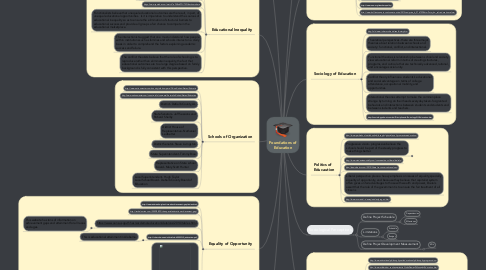Foundations of Education
by Zach King


1. http://cber.cba.ua.edu/rbriefs/news091400.html
1.1. This article talks about the improvement in educational attainment in Alabama.
2. Philosophy of Education
2.1. http://www.educationalphilosophy.net/educational-philosophy-progressivism
2.2. http://www.wilderdom.com/experiential/JohnDeweyPhilosophyEducation.html
2.3. http://dewey.pragmatism.org/
2.4. http://www.mightystudents.com/essay/John.Dewey-Role.Teacher.3949
2.5. https://www.marxists.org/archive/novack/works/1960/x03.htm
2.6. In a progressive setting, the teacher is no longer the authoritarian figure from which all knowledge flows; rather, the teacher assumes the peripheral position of a facilitator. The teacher encourages, offers suggestions, questions, and helps plan and implement courses of study.
2.7. Dewey proposed that children learn both individually and in groups. He believed that children should start their mode of inquiry by posing questions about what they want to know. Today, we refer to this method of instruction as the problem-solving or inquiry method.
3. Curriculum and Pedagogy
3.1. http://education.stateuniversity.com/pages/1794/Bobbitt-Franklin-1876-1956.html
3.2. The social efficiency curriculum was built in the regards that different groups of students, with different sets of needs, should receive different types of education.
3.3. http://edglossary.org/hidden-curriculum/
3.4. http://journals.lww.com/academicmedicine/Fulltext/2009/04000/Hidden_in_Plain_Sight__The_Formal,_Informal,_and.17.aspx
3.5. A very strong force that hidden curriculum students receive is a message that these things are just not important.
3.6. http://www.slideshare.net/charlottemalinao/curriculum-theory-24635017
4. Politics of Educaution
4.1. http://www.parkschool.net/about/philosophy/principles-of-progressive-education/
4.2. Progressive vision- progressive believe the school should be part of the steady progress to make things better.
4.2.1. Included
4.2.2. Included
4.2.3. Excluded
4.3. http://www.studentnewsdaily.com/conservative-vs-liberal-beliefs/
4.4. http://news-basics.com/2010/liberal-vs-conservative-values/
4.5. Liberal perspective place a heavy emphasis on issues of equality, specially equality of opportunity, and because they believe that capitalist system often gives unfair advantages to those with wealth and power, liberals assert that the role of the government is to ensure the fair treatment of all citizens
4.6. http://www.uvm.edu/~dewey/articles/proged.html
5. Schools of Organization
5.1. http://www.nationmaster.com/country-info/compare/China/United-States/Educatio
5.2. http://www.nationmaster.com/country-info/compare/Australia/United-States/Education
5.3. District- DeKalb County, AL
5.4. State Senators- Jeff Sessions and Richard Shelby
5.5. District House of Representative- Nathaniel Ledbetter
5.6. District Senator- Steve Livingston
5.7. State Superintendent- Tommy Bice
5.8. Representative on State school board- Mary Scott Hunter
5.9. Local Superintendent- Hugh Taylor Local School Board- DeKalb County Board of Education
6. Equality of Opportunity
6.1. http://www.edweek.org/ew/issues/achievement-gap/index.html
6.2. http://rachelnorton.com/2009/08/19/the-special-education-achievement-gap/
6.3. https://www.census.gov/hhes/socdemo/education/data/cps/2014/tables.html
6.3.1. This website has tons of information on achievement gaps and attainment for all races and ages.
6.4. http://cber.cba.ua.edu/rbriefs/ab2003Q2_education.pdf
6.4.1. This is educational attainment in Alabama.
6.5. Alabama educational attainment.
7. History of U.S. Education
7.1. http://www.u-s-history.com/pages/h1061.html
7.1.1. Materials
7.1.2. Personel
7.1.3. Services
7.1.4. Duration
7.2. http://plato.stanford.edu/entries/dewey-political/
7.3. John Dewey advocated the creation of curriculum that would allow for the child's interest and developmental level while introducing the child to "the point of departure from which the child can trace and follow the progress of mankind in history, getting insight also into the materials used and the mechanical principles involved" (Dworkin, M.S., 1959,p. 43).
7.4. Dewey advocated active learning, starting with the needs and interests of the child; he emphasized the role of experience in education.
7.5. http://www.johndewey.org/welcome-john-deweyorg/
8. Sociological Perceptives
8.1. Define Project Schedule
8.1.1. Dependencies
8.1.2. Milestones
8.2. Limitations
8.2.1. Schedule
8.2.2. Budget
8.3. Define Project Development Measurement
8.3.1. KPI's
9. Educational Inequality
9.1. http://www.huffingtonpost.com/joseph-w-gauld-/us-education-and-the-sat-_b_5881292.html
9.2. http://www.wcer.wisc.edu/news/coverStories/decrease_ed_inequity.php
9.3. https://www.youtube.com/watch?v=F48o6PFU7XQ#action=share
9.4. Functionalists believe that unequal educational outcomes are the result, in part, of unequal educational opportunities. Is it is imperative to understand the sources of educational inequality so as to ensure the elimination of structural barriers to educational success and provide all groups a fair chance to compete in the educational marketplace.
9.5. The interactionist suggest that one must understand how people within institutions such as families and schools interact on a daily basis in order to comprehend the factors explaining academic success and failure.
9.6. The conflict theorists believe that the role of schooling is to reproduce rather than eliminate inequality, the fact that educational outcomes are to a large degree based on family background is fully consistent with this perspective.
10. Educational Reform
10.1. http://educationnext.org/gains-in-teacher-quality/
10.2. http://webapps.dol.gov/elaws/whd/flsa/scope/ee15astw.asp
10.3. https://youtu.be/NqCGzmaMx70
10.3.1. This is a youtube video on educatonal reform.
10.4. https://youtu.be/FLqc_9VxfCE
10.4.1. This is a youtube video on school improvement.
